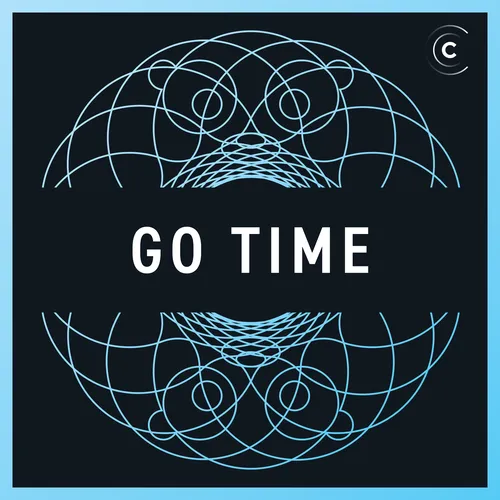
Go Time: Golang, Software Engineering
Your source for wide-ranging discussions from all around the Go community. Panelists include Mat Ryer, Jon Calhoun, Natalie Pistunovich, Johnny Boursiquot, Angelica Hill, Kris Brandow, and Ian Lopshire.
We discuss cloud infrastructure, distributed systems, microservices, Kubernetes, Docker... oh and also Go!
Some people search for GoTime or GoTimeFM and can't find the show, so now the strings GoTime and GoTimeFM are in our description too.
- Update frequency
- every 7 days
- Average duration
- 64 minutes
- Episodes
- 347
- Years Active
- 2016 - 2024

Building for Ethereum in Go
In this episode, we will talk about building for Blockchain in Go. We are joined by two of the co-founders of Prysmatic Labs (a company behind the upgrades to the Ethereum network). Raul Jordan and P…

Are frameworks getting an Encore?
Tools and frameworks that aim to boost developer productivity are always worth a closer look, but we don’t often consider the trade-offs for whichever we settle on. In this episode, we discuss the qu…

Event-driven systems
In this episode we talk with Daniel and Steve about their experience with event-driven systems and shed some light on what they are and who they might be for. We explore topics like the complexity of…

What makes wonderful workshops?
Perspectives from both the workshop leaders perspective, as well as the workshop participants. What are some top tips, things to watch out for, and ways to innovate and keep your participants engaged…

Building startups with Go
Startups are all about iterating quickly, building MVPs, and finding that elusive product market fit, so how does Go fit into that picture? Is Go a good choice for startups, or is it exclusively for …

TCP & UDP
The internet wouldn’t exist as we know it if it weren’t for TCP and UDP, yet many developers don’t quite understand the technology powering the web. In this episode we talk with Adam Woodbeck, author…

The ultimate guide to crafting your GopherCon proposal
The Call for Proposals for GopherCon 2021 is open from Monday, April 5th to Sunday, April 25th. Kris Brandow, an experienced GopherCon speaker, has published a series of guides to assist Gophers as t…

Trials and tribulations of testing in Go
Testing can be hard, how to test, where to test, what is a good test? All questions that can be deceptively difficult to answer. In this episode we talk about the trials and tribulations of testing a…

Releasing with (and without) GoReleaser
Carlos Alexandro Becker joins Mat, Natalie, & Johnny to discuss the ins and outs of releasing your Go code. Carlos created and maintains GoReleaser, a popular tool that helps you deliver your Go bina…

Design philosophy
In this insight-filled episode, Bill Kennedy joins Johnny and Kris to discuss best practices around the design of software in Go. Bill talks through scenarios, lessons learned, and pitfalls to avoid …

go:embed
Carl (Director of Technology for Spotlight PA) and Wayne (Principal Engineer at GoDaddy) join Mat and Mark to talk about the new go:embed feature in Go 1.16. They discuss how and when to use it, comm…

Go at Clever
In this episode we explore how Clever started using Go. What technologies did Clever start with, how did they transition to Go, and what were the motivations behind those changes? We then explore som…

Indecent (language) Proposals: Part 2
This is the second part of a discussion about Go language proposals that may or may not make it into the language. Listen to part one as well!
Changelog++ members save 5 minutes on…

The art of reading the docs
Documentation. You can treat it as a dictionary or reference manual that you look up things in when you get stuck during your day-to-day work OR (and this is where things get interesting) you can imm…

Indecent (language) Proposals: Part 1
In this episode, we discuss some proposed changes to Go covering a range of subjects, from magical interfaces, to enhancing range loops, make and new with inferred types, lazy values, and more. We al…

When Go programs end
Michael Knyszek from the Go team joins us to talk about what happens when a program ends. How are file handles cleaned up? When are deferred functions run, and when are they skipped entirely? Is ther…

Why writing is important
In this episode we talk about various types of writing and how we as Go developers can learn from them. Whether it is planning and preparing to write, communicating with team members, or making our c…

CUE: Configuration superpowers for everyone
On this episode we learn how to Configure, Unify, and Execute things. What’s CUE all about? Well, it’s an open source language with a rich set of APIs and tooling for defining, generating, and valida…

We're talkin' CI/CD
Continuous integration and continuous delivery are both terms we have heard, but what do they really mean? What does CI/CD look like when done well? What are some pitfalls we might want to avoid? In …